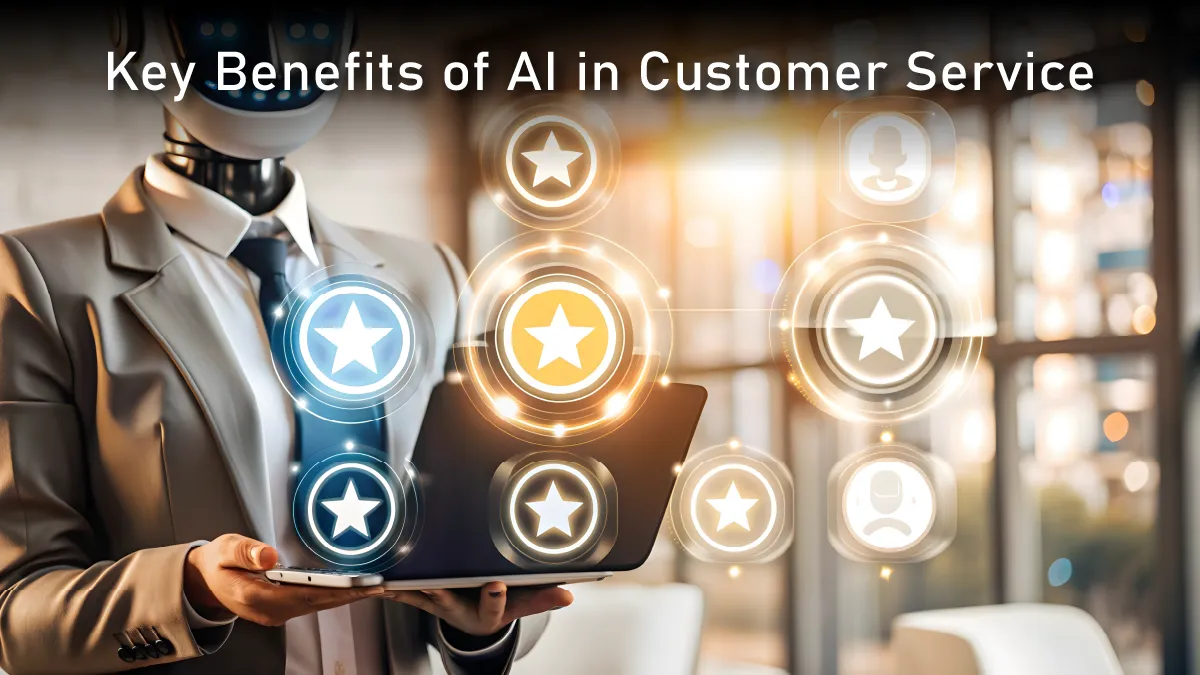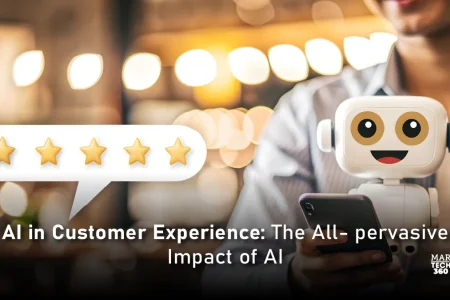Artificial Intelligence (AI) has become a cornerstone of modern business strategies, changing how companies interact with their customers. Integrating AI into customer experience (CX) is more than just a trend; it’s a crucial development that improves satisfaction, loyalty, and efficiency.
What is AI in Customer Experience?
AI in customer experience refers to the integration of AI into various aspects of customer service and engagement. This includes using generative AI to create content, chatbots for real-time support, virtual assistants, and analytics tools to analyze customer data. The goal is to streamline interactions, provide timely assistance, and deliver tailored services that resonate with individual preferences. For example, AI can recognize patterns in customer queries, enabling automated systems to provide accurate answers or direct complex issues to the right human agent. This capability allows businesses to enhance service quality while improving response times. According to IBM, AI can enhance CX by 70%. This indicates the crucial role of AI in CX.
Key Benefits of AI in Customer Service

AI is revolutionizing customer service by providing innovative solutions that enhance how businesses interact with their customers. AI technologies are emerging as essential tools as organizations seek to meet the growing demands for faster and personalized service. Some of the key benefits of integrating AI into customer service have been highlighted below.
- 24/7 Availability: AI provides round-the-clock support through chatbots and virtual assistants, allowing customers to get immediate help anytime. This meets the demand for quick service and boosts overall customer satisfaction.
- Personalization: AI analyzes individual customer data to create tailored experiences. By understanding preferences and behaviors, businesses can offer personalized recommendations and promotions. For example, Starbucks uses AI to suggest menu items based on past purchases and local factors.
- Predictive Analytics: Using machine learning (ML), companies can anticipate customer needs by analyzing historical data. AI identifies patterns that signal potential issues or engagement opportunities, enhancing the customer experience and helping retain customers.
- Improved Efficiency: AI automates routine tasks like data entry and inquiry handling, allowing human agents to focus on more complex issues. This increases productivity within support teams and reduces manual processing times.
- Real-time Sentiment Analysis: AI can analyze customer emotions during interactions across various channels. It enables businesses to quickly respond to feedback and complaints. This helps resolve issues before they escalate and improves brand perception.
Incorporating AI into customer service offers significant advantages that can transform the customer experience. It empowers businesses to respond effectively to customer needs. By streamlining operations and enhancing interactions, organizations can improve efficiency and build strong relationships with their customers. As AI continues to evolve, its role in customer service will become even more critical in driving satisfaction and loyalty.
Also Read: Future of AI in Customer Service: What to Expect?
Case Studies: Real-world Applications of AI in Customer Experience
AI significantly enhances CX through various applications. Key applications include personalized recommendations, where AI analyzes browsing history and purchase patterns to suggest tailored products. AI tools also offer real-time personalization, which adjusts website content based on customer behavior.
AI chatbots automate responses to common inquiries, freeing human agents to focus on complex issues. AI uses predictive analytics to anticipate customer needs and issues. Emotion recognition enables more empathetic interactions. Additionally, sentiment analysis helps gauge customer feedback, allowing businesses to refine their offerings effectively. AI also generates personalized marketing messages. It tracks wishlists and shopping carts to send timely reminders. The integration of voice assistants like Siri or Alexa enhances convenience for customers. Furthermore, AI-driven loyalty programs provide personalized rewards based on individual buying habits. These applications demonstrate how AI is making customer experience more personalized and efficient.
AI is reshaping the way companies engage with their customers. Several organizations have used AI to boost customer interactions and satisfaction. Find some notable examples of how companies are leveraging AI to transform their customer experience.
- Grove Collaborative, a sustainable e-commerce platform, utilizes AI-powered insights to enable agents to provide personalized service based on customers’ order histories and preferences. This approach enhances the overall shopping experience by making it more relevant and engaging.
- Unity, a 3D development platform, implemented AI solutions that allowed it to deflect thousands of support tickets while significantly improving response times. As a result, Unity achieved a remarkable increase in its customer satisfaction score.
- Sephora’s Virtual Artist App uses augmented reality (AR) combined with AI to allow customers to virtually try on makeup products before purchasing. This innovative application not only enhances the shopping experience but also empowers customers to make informed decisions.
The successful integration of AI into CX strategies demonstrates its potential to significantly enhance service quality and customer satisfaction. Using AI, companies can offer personalized support and simplify processes. This helps customers make informed choices. As businesses increasingly adopt AI tools & technologies, they will enhance their efficiency and build stronger relationships with customers, paving the way for future growth and innovation.
Challenges & Considerations
Integrating AI into CX brings significant advantages, but it also introduces several challenges that businesses need to navigate. Addressing these challenges is crucial for maximizing the benefits of AI while maintaining customer trust and satisfaction.
Balancing Automation with Human Interaction: AI can handle many tasks efficiently; however, customers value human empathy and understanding in certain situations. Striking the right balance between automated services and personal interaction is essential for maintaining trust.
Data Privacy Concerns: As businesses collect vast amounts of data to enhance CX, they must prioritize data security and privacy compliance. Transparency in how customer data is used is critical for building trust.
Integration Complexities: Implementing AI solutions requires seamless integration with existing systems. Businesses must ensure that new technologies do not disrupt current operations or negatively impact CX.
Successfully managing these factors will enable organizations to enhance CX while fostering trust and loyalty among their clients.
Future of AI in Customer Experience
As technology continues to evolve, several trends are likely to shape the future of AI in CX:
Recognizing Emotions: Future advancements may enable machines to recognize and respond to human emotions through voice tone or facial expressions. This could lead to even more empathetic interactions between brands and customers.
Immersive Experiences with AR/VR: The integration of AR and VR with AI could revolutionize how customers interact with products before making a purchase decision.
Enhanced Sentiment Analysis: Improved algorithms will help businesses gauge customer sentiment across various platforms. This will enable them to tailor responses effectively.
Conclusion
AI has a profound impact on CX, enabling businesses to leverage technologies like NLP, ML, and Gen AI to create personalized and efficient interactions. As organizations adopt these innovations, they will be better equipped to meet evolving customer expectations and drive growth. Harnessing AI is now essential for businesses to thrive in a competitive market. The future of AI in CX holds great potential as companies explore new ways to integrate AI into their CX strategies.

